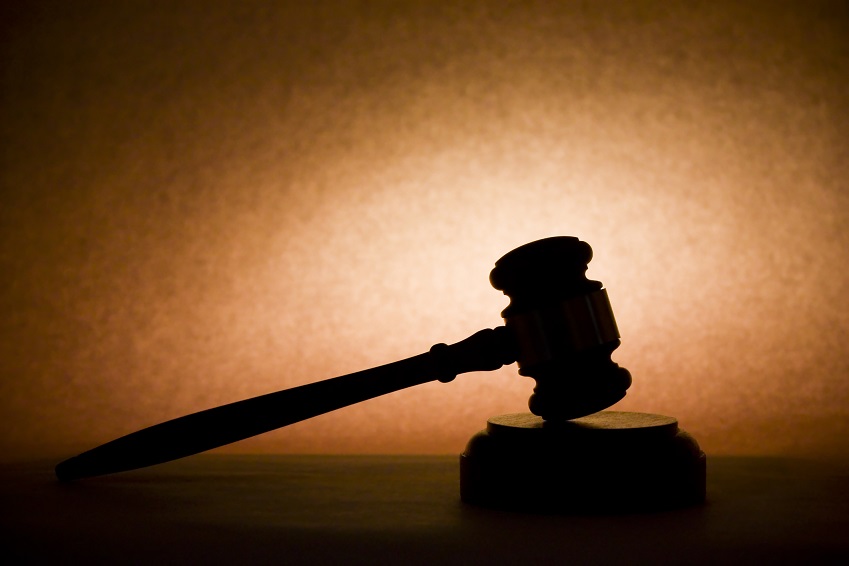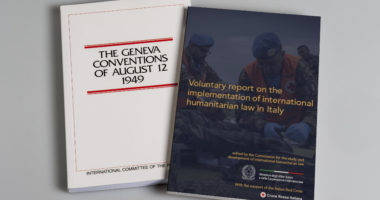The first prisoners of war (POWs) in the international armed conflict in Ukraine have been prosecuted and sentenced. These trials will herald hundreds, if not thousands more, as the sides to the conflict have stated their intention to hold POWs in their hands accountable for serious crimes: Russia has reportedly opened investigations into over 1,000 Ukrainian POWs, while the office of Ukraine’s chief prosecutor claims to have registered over 15,000 allegations of war crimes and to have initiated at least 80 proceedings against alleged perpetrators. At the same time, the International Criminal Court is pursuing its own investigations into the situation in Ukraine. At the beginning of what is likely to be an avalanche of legal proceedings, mostly against POWs, it is worth recalling the rules that apply to their trials.
In this post, ICRC Legal Adviser Yvette Issar outlines the fair trial guarantees that must be available to POWs if legal proceedings are instituted against them. These are contained in the Third Geneva Convention (GCIII) adopted in 1949, and now universally ratified. More comprehensive information on these rights is contained in the ICRC’s recently updated Commentary on the Third Geneva Convention.
Combatants captured on the battlefield are at risk of unfair treatment in many ways, including wrongful or unfair prosecution. Being interned, they are in a weaker position to mount an effective defence compared to people who are not deprived of their liberty. Furthermore, as they are in the hands of an enemy State, they have to contend with the sentiments of their captors.
During the Second World War, these risks became a terrifying reality for many POWS. Trials were often accompanied by serious shortcomings. Many were prosecuted and harshly sentenced, some even to the death penalty, without any meaningful due process. At the end of the conflict, and as a direct result of the experiences of suffering it caused, States agreed on a series of minimum safeguards for POWs facing penal or disciplinary proceedings. These are contained in Articles 82 – 108 of the Third Geneva Convention (GCIII). As increasing numbers of POWs face trial, recalling these rules is vital to avoid repeating the mistakes of history.
When can a prisoner of war be prosecuted?
Article 4 of GCIII describes the categories of people who must be recognized as POWs. The status is accompanied by international rules protecting persons who fall under that category. POW status is granted to members of a State’s armed forces – i.e. combatants. It is also granted to other armed forces fighting on behalf of a Party to the conflict, provided they fulfil certain requirements to distinguish themselves from civilians. Finally, civilian staff, war correspondents, contractors and other civilians who accompany the armed forces are entitled to POW status.
Combatants are entitled to participate in hostilities on behalf of a State. Once captured, such persons may be interned to prevent them from returning to the battlefield to take part in the fighting. While they are interned, they must be treated humanely. Importantly, they are immune from prosecution for taking part in hostilities (para. 20).
Although they must not be prosecuted for simply having fought on behalf of a Party to the conflict, prisoners of war may be tried if they commit an offence against the criminal code of the Detaining Power. Furthermore, they must be tried if they have committed grave breaches of the Geneva Conventions or other war crimes.
What treatment must a POW be afforded if prosecuted?
General principles applicable to trials of POWs
POWs facing trial continue to benefit from the provisions of GCIII. Several important consequences flow from this. First, the Article 13 requirement of humane treatment continues to apply. They must continue to be protected against public curiosity throughout their internment, including while they face legal proceedings. While this obligation is incumbent on the Detaining Power, media outlets should reflect on their coverage of trials of POWs to ensure that such coverage does not expose POWs to public curiosity or lead to their being publicly humiliated. No physical or mental torture, nor any other form of coercion, may be imposed on POWs (Article 17; Article 99(2)).
Legal proceedings against POWs must abide by general legal principles, including that prisoners have a right to mount an effective defence and must not be coerced to admit guilt. They must not be subjected to collective punishment (Art. 87(3)), and may only be held criminally accountable for acts for which they bear individual responsibility. They may only be tried by courts that offer ‘the essential guarantees of independence and impartiality as generally recognized’.
Failure to afford POWs the rights of a fair and regular trial amounts to a grave breach of the Third Convention, which itself entails criminal prosecution.
The principle of assimilation
POWs are military personnel. When captured, certain standards for their treatment are taken by referring to the standards applicable to the military personnel of the Detaining Power. This is referred to as the principle of assimilation (Section A.3.c), and features in Article 82 and Article 102 of GCIII.
However, reference to the standards applicable to members of the Detaining Power’s own forces is not sufficient. The Convention lays out minimum guarantees that must be afforded to all POWs irrespective of the treatment afforded by a Detaining Power to its own military personnel (para. 36).
Pre-trial and investigation stages
The requirement to afford a fair and regular trial kicks in during the pre-trial and investigation phases (para. 4027). GCIII recognizes that judicial investigations during armed conflicts may be complex. It requires that such investigations be carried out ‘as rapidly as circumstances permit’. The ICRC’s recently updated Commentary on the Third Geneva Convention (hereafter referenced as the Updated Commentary) notes that, ‘[i]t is in the interests of a prisoner of war suspected or accused of committing a crime that investigations be conducted thoroughly and with the requisite care, while at the same time occurring at a pace that preserves both their right to be tried as soon as possible and to be presumed innocent pending a final judgment to the contrary’. (para. 4028).
POWs are already deprived of their liberty, reducing the need for pre-trial confinement. However, they may be confined awaiting trial if a member of the Detaining Power’s own armed forces in a similar situation would also be subjected to the measure, or if such confinement is essential to the interests of national security. Pre-trial confinement must never exceed three months (paras 4037-4041) and any time spent in pre-trial confinement must be deducted from any sentence awarded to a POW (paras 4042-4046).
Certain mechanisms of supervision and control are built into GCIII, including the Protecting Power and the ICRC. Under Article 104 of GCIII, the Detaining Power must notify the Protecting Power of any judicial proceedings instituted against a POW. The notification must contain the particulars of the POW, information about the place they are being interned, the charges being brought against them and the place and date of the trial. The notification must be made at least three weeks prior to the POW being placed on trial, enabling the Protecting Power to supervise the application of the Convention. In recent practice, States have not appointed Protecting Powers, and the ICRC has often fulfilled the functions of Protecting Powers under its own initiative (paras 45-51 and paras 1296-1302). Additionally, the ICRC has the right to access all individuals detained in relation to an international armed conflict, including civilian internees and POWs. To supervise respect for their rights, the ICRC must be able to visit any POWs – including those facing trial – wherever they may be (Article 126).
Trial stage
Article 105 of GCIII contains the requirements that must be met during trials of POWs. A very detailed provision, it entitles a POW undergoing trial to assistance by a fellow POW, and to defence by a qualified lawyer appointed either by the POW themselves, or the Protecting Power. If neither the POW nor the Protecting Power can secure defence counsel, the Detaining Power must provide a lawyer for the POW. Additionally, the POW must be able to call witnesses (sections C and D).
Lawyers acting on behalf of a POW must have sufficient time and the necessary facilities in order to mount an effective defence. This includes the ability to have private discussions with the POW, and also to confer with witnesses (paras 4114-4124). Charges on which the POW is to be arraigned must be communicated to the POW and to the lawyer serving in their defence in good time before trial to allow them to prepare (paras 4126-4132).
In order to meaningfully participate in proceedings, the POW must have access to the services of an interpreter (paras 4096-4100). Finally, representatives of the Protecting Power (or if one has not been appointed, a representative of the ICRC) must be able to attend the trial of the POW, unless for reasons of State Security the trial is held ‘in camera’ (paras 4133-4137).
Under Article 106, prisoners of war must be allowed to appeal a first-instance judgement, or to petition for pardon or reprieve. The rights enumerated in Article 105 are applicable until the end of their appeal or petition (paras 4125 and 4149).
Judgements and sentences must be reported to the Protecting Power, the prisoners’ representative and the accused POW in accordance with the terms of Article 107. If no Protecting Power has been appointed, the notification must be made to the ICRC (paras 4190-4192).
Sentencing and post-trial stages
POWs may only be sentenced to those penalties that members of the Detaining Power’s armed forces may face in connection with the same acts. Certain punishments are prohibited altogether – collective punishment, corporal punishment, imprisonment in premises without daylight and generally any form of torture or cruelty (section E). POWs may also not be deprived of their rank or from wearing their badges (section F).
When sentencing a POW, the authorities must consider, to the widest extent possible, that the POW is not bound to it by any duty of allegiance, and that they are in the power of the Detaining Power as a result of circumstances outside of their control. The authorities are not bound to apply the minimum penalties prescribed for a crime, and these may be reduced in favour of a POW. Moreover, GCIII requires the Detaining Power to ‘exercise the greatest lenience’ and to opt, wherever possible, for disciplinary rather than judicial measures (section D)
POWs must serve their sentences in the same establishments and under the same conditions as members of the Detaining Power’s armed forces (paras 4201-4205). However, in all cases, the conditions must conform to the requirements of health and humanity (4206-4208). Women must be confined in separate quarters and be supervised in their detention by women guards (section D). While serving their sentence, POWs must be able to send and receive correspondence, relief parcels, to take regular exercise and to receive medical care and spiritual assistance (section E).
Even if they are convicted, they remain POWS, and continue to benefit by the provisions of the Convention to the extent that these are not practically impossible because of confinement or the carrying out of the sentence (Article 85).
Death penalty
The Third Convention contains additional rules that apply to death sentences (here, here and here). A POW may not be sentenced to death unless the court’s attention has specifically been drawn to the fact, as already mentioned, that the prisoner does not owe allegiance to the Detaining Power, and their situation is a result of circumstances outside of their control. Any sentence of death must be communicated to the Protecting Power or to the ICRC, and cannot be carried out until six months after such a notification has been made (paras 3996-4002).
Transfer; end of sentence
POWs may only be transferred to other Parties to the Third Convention, after the Detaining Power has established that the transferee Power is willing and able to apply the Convention. The Updated Commentary does not rule out transferring POWs to international courts or tribunals to face accountability, but notes that, ‘the ability and willingness of the receiving international court or tribunal to guarantee standards at least as protective as those set out in the Convention, in particular as relates to pretrial detention and fair trial guarantees, will […] be a relevant consideration’ (para. 1532).
At the end of active hostilities, POWs have to be released without delay (Article 118). The Detaining Power may nevertheless continue to detain POWs undergoing judicial proceedings or serving criminal sentences (Article 115). However, they may also decide to repatriate such POWs or accommodate them in a neutral country prior to the expiration of proceedings or sentences.
Obligations in peacetime
In order to be able to afford judicial guarantees to POWs during armed conflicts, States must, already in peacetime, review those elements of their military regulations that would become applicable to POWs via the principle of assimilation. For instance, in countries where military personnel are tried by courts martial, efforts would need to be made to ensure that such bodies would be able to ensure independent and impartial trials to prisoners of war. They would also need to work out whether civilian POWs could be tried by courts martial, given that many countries have constitutional limits against trying civilians by military courts. The fact that there have been relatively few international armed conflicts since the end of WWII means that a majority of States may be unprepared to deal with any POWs they may capture, or that may be transferred to them by a belligerent.
Conclusion
The rules on judicial proceedings in GCIII are no impediment to achieving justice. By seeking fair and regular proceedings for POWs, these rules ensure they will be treated with humanity. The rules aim to prevent the injustice of unfair prosecutions and sentences. The knowledge that, if tried, one will be able to defend oneself fully against charges brought is a comfort to prisoners of war and their loved ones, who already face considerable uncertainty.
See also
- Cordula Droege, GCIII Commentary: ten essential protections for prisoners of war, July 23, 2020
- Jemma Arman, GCIII Commentary: protecting the honour of prisoners of war, September 3, 2020
- Jean-Marie Henckaerts, GCIII Commentary: ICRC unveils first update in sixty years, June 18, 2020






Indicative and thoughtful article that meets the contemporary developments in Ukraine . In the same vein addressing this debatable and most controversial issue that relates prosecuting POWs before the end of military hostilities should have tackles several key and governing issues due to the uniqueness and precedence of tis case . I will cover up some of the remarkably substantial issues as follow :
1- Mutual hasty and not expeditious trial of POWs as a result of the on-going international armed conflict in Ukraine reflects an innovative and outrageous weapon of revenge that flagrantly provisions of 3rd Geneva convention of 1949 .
2- Reservations of the convention party that matters prosecuting POWs over their previous alleged war crimes committed before their falling in the custody of the detaining power is a crucial finding and key claim to a state party of the convention , therefore the Russian Federation as a successor of Former Soviet Union reservation on article 85 of the convention necessitates research and study .